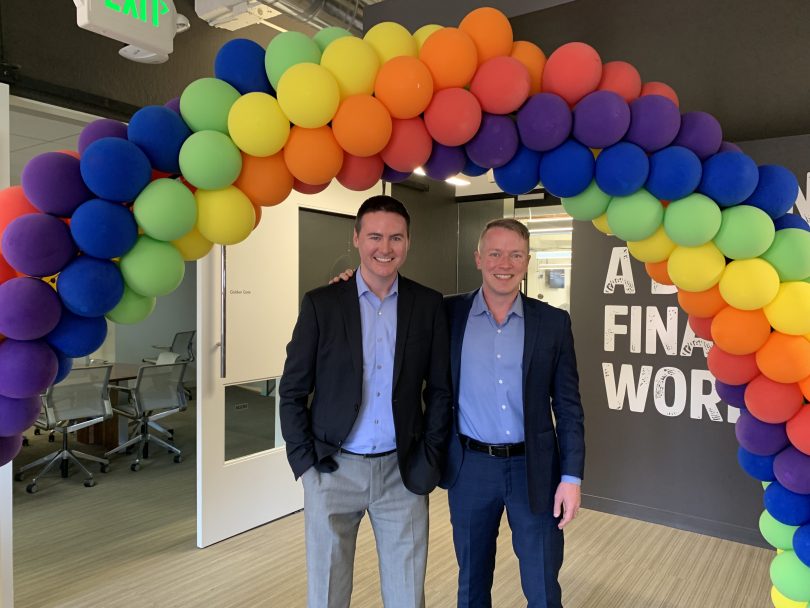Photo of the author above right
My most important crisis communications test didn’t come through my PR work with PayPal, Snowflake or Tetris.
It came in college.
That’s when my big secret became the talk of the prestigious UT-Austin Plan II Honors Program. My diary had been stolen, and the contents had been shared throughout the student body. Looking back at the situation now, I’m not certain what was worse: my literary efforts to sound like a combination of Ayn Rand and Anais Nin — or my verbal wrestling with being gay.
All glibness aside, my crash course in crisis communications meant I had to determine quite quickly how to position the news, how to react and how to ensure that it wouldn’t spread to others who weren’t ready to come to terms with my sexuality. LGBTQIA people grapple with the complex parts of communication quickly in their lives when they are out. That requires every component of a PR program, from stakeholder communication (i.e., breaking the news to your parents) to ongoing market education (telling others).
Eventually, my communications plan worked. In fact, I would end my college career as the class president of the Plan II Students Association.
But I learned something: Like any communication program, communicating never stops. For example, I still need to course-correct from time to time: “Oh, I don’t have a wife. I’m married to a great guy from France.”
For LGBTQIA people in public relations, that creates a unique challenge: How do you run your professional PR program with the personal one in your life?
Right now, there are significant issues in today’s culture wars. Conservatives want to prevent school kids from hearing the word “gay.” There are a variety of pernicious ways that trans students are being targeted. A woman’s right to control her own body is being curtailed in Texas, Oklahoma and other states.
And our agency, Bospar, refuses to stay quiet about it. As we have said before: We see this in our business interest to speak out for women’s rights since an overwhelming majority of our staff are women. In fact, an overwhelming percentage of our client contacts are women, too.
Several industry observers have noticed. For example, the PR trade publication O’Dwyer’s wrote: “Bospar leads the way for PR firms dealing with the fallout of the Texas abortion ban, which may trigger a flight of young PR talent from the state… Bospar announced its plan Sept. 9, a day ahead of a similar plan by Salesforce.”
Queer and tech outliers share DNA
When it comes to LGBTQIA rights, we are just as self-interested. Not only does our muscle memory from PR start with many of us coming out, but we see similarities between queer people who are disrupting the status quo and technology companies disrupting legacy paradigms of doing business the old-fashioned way.
Our reputation for this approach even led leaders of San Francisco Pride to ask us to lead their communications program for the first real Pride march since the pandemic. PRWeek even profiled our efforts with this feature: “Bospar steps in last minute to help San Francisco Pride.”
Leadership doesn’t come free — it comes at a price
I end with this, a not-so-dirty secret I have learned in the industry for two decades. No matter how straight, skinny or colorless you try to pass yourself off as, it does not guarantee professional success. Remember, business is still business; many other points are the final deciding factors. With this in mind, challenge those that try to dictate your professional and personal narrative, yet in a dignified and compassionate way that leaves them no choice but to embrace your redefined path. Speaking from experience, I guarantee you this works!
Instead of hating the bully that outed me, through my compassion many years later, I had the chance to meet him and allow him to apologize. At the same time, my communications skills empowered me to write an op-ed for The Dallas Morning News, detailing the experience in a dignified and peaceful manner and, most important, sharing my story to help fellow members of the LGBTQIA community. Standing up for your beliefs and creating your professional image are not mutually exclusive — think of it as your unique brand that makes you an even stronger PR professional.
Curtis Sparrer is the co-founder and principal of Bospar PR. He has represented brands like Snowflake, PayPal, Tetris — even the alien hunters of the SETI Institute! His writing has appeared in Adweek, Forbes, the Dallas Morning News and PRWeek. He is the president of the San Francisco Press Club, serves on the board of PRSA’s Silicon Valley Chapter and is a lifetime member of the National Lesbian Gay Journalist Association. PRWeek has profiled Curtis’ work extensively, from his time with Star Trek’s George Takei to leading crisis communications for San Francisco Pride.
[Photo courtesy of bospar pr]






